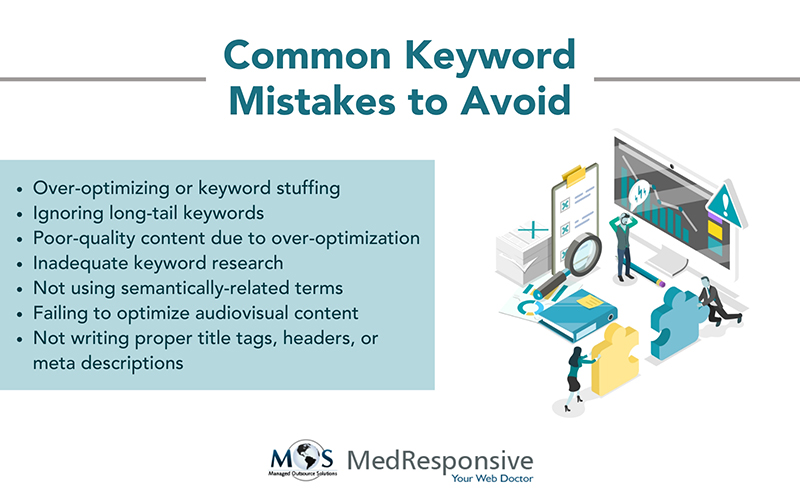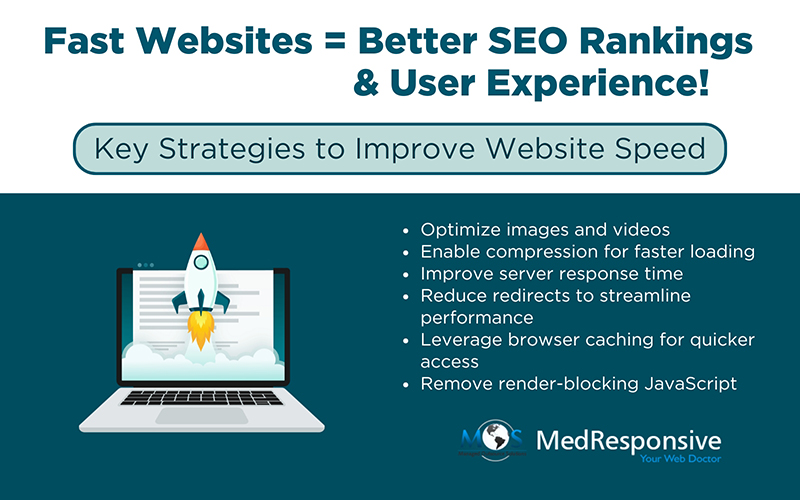In this changing digital era, achieving a strong online presence is important for medical professionals and healthcare organizations. With several healthcare providers competing for attention, search engine optimization (SEO) is important to help their websites rank high in search engine results. Patients (both current and potential) are increasingly turning online to locate potential healthcare providers. This shift in patient behavior has made effective SEO essential for medical practices. As per a HubSpot study, approximately 75 percent of users never scroll past the first page of search results.
While there are many medical professionals worldwide with medical websites, not all of them do a great job at promoting them. In the pursuit of effective SEO, medical professionals unknowingly make certain SEO mistakes that can hamper their online visibility and potential patient reach. This post explores in detail ten SEO mistakes medical professionals should avoid and how a reputable healthcare SEO agency can help in this regard.
Healthcare SEO Mistakes to Avoid for Better Online Visibility
- Failing to Update Content about Your Medical Practice – Not publishing good content or updating the outdated content is one of the most common SEO mistakes. Publishing content overstuffed with keywords and technical details is an SEO strategy that many websites tend to follow. It is important to note that the initial step to being a medical SEO expert is to write the best type of content you can. Search engines favor websites that provide fresh, relevant, and informative content. Regularly updating your website content demonstrates that your website is actively maintained and relevant. Look for creative ways to educate casual readers about your medical practice. Develop a content strategy that includes updating your website with new information, articles, blog posts, and other relevant content. This keeps your website engaging, informative, and up to date, attracting both search engines and your audience. The more digestible the content is, the higher will be your SEO rankings.
- Ignoring Local SEO Optimization – One of the most common yet significant mistakes in medical SEO is ignoring local search engine optimization. Often, patients tend to seek healthcare services within their local vicinity. So, it is essential for medical professionals to rank high in local search results. If you fail to optimize for local search, potential patients may not see your practice online. The ideal solution is to ensure that your medical practice is listed on Google Business Profile and other relevant local directories. Providing accurate location and contact information is important. Encourage patients to leave reviews on platforms like Google and other healthcare-specific review sites, as these reviews can significantly influence local search results. A reputable healthcare SEO agency can help modify your local SEO strategies and ensure that your practice ranks well for local searches.
- Over Usage of Keywords – Many medical SEO marketers believe that the greater the number of keywords, the better will be the article. When it comes to SEO, keyword stuffing is a common mistake. This can harm your SEO efforts as search engines prioritize high-quality, valuable content over keyword-stuffed text. Some of the most common mistakes regarding keyword usage are – Over-optimizing (or keyword stuffing), disregarding long-tail keywords, writing poor-quality content, not doing proper keyword research, not using semantically related terms, not optimizing audiovisual content and not writing proper title tags, headers, or meta descriptions. To avoid these mistakes, do a proper keyword research and analyze the keyword density for each vital term. Use keywords naturally and ensure they fit within the context of your content. Also, try to focus on long-tail keywords – specific, niche phrases that attract patients. This can significantly improve your chances of ranking higher for searches that are more relevant to your services. A reliable search engine optimization company can help you perform thorough keyword research to ensure you are targeting the right phrases.
- Not Investing in a Mobile-friendly Website – With a greater number of patients performing online searches on mobile devices, having a mobile-friendly website is no longer a choice, but a necessity. Not having a responsive healthcare website can prevent potential patients from seeing your practice online. Google’s mobile-first indexing means that the mobile version of your website is prioritized in search rankings.
A healthcare website that is slow, non-responsive and difficult to navigate on mobile devices will result in higher bounce rates and lower rankings. So, make sure that your website is fully optimized and offer a seamless experience such as fast load-times, easy-to-read text, and intuitive navigation on all devices, including smartphones and tablets. Partnering with a search engine optimization company can ensure that your website’s mobile experience aligns with best practices for both users and search engines.
- Not Checking Your Website Speed – Generally, patients tend to leave a website when its page load time is too long. As per reports, the average loading speed for a website may be up to 8.66 seconds. However, most medical SEO experts recommend your website has at least a loading speed of three seconds or less. While implementing digital marketing strategies, many experts often forget to optimize their website’s loading speed, which can significantly affect traffic rates. Some of the reliable optimization strategies include – optimizing images and videos, enabling compression, improving server response time, reducing redirects, leveraging browser caching and removing render-blocking JavaScript.
- Cheating on your Strategy to Earn Backlinks – Whether it’s for local SEO or international SEO for medical practices, getting relevant backlinks can help boost your online marketing. However, many people in their quest to improve their SEO rankings, try to create private backlink networks, which is considered ’cheating.’ Google may penalize this. The solution for this problem is – don’t purchase backlinks. By implementing better and relevant keywords and writing high-quality, relevant content, you can attract a greater number of visitors.
- Not Updating Your Medical SEO Strategy – One of the crucial aspects about creating content and optimizing your organic search results is to keep track of Google’s algorithm trends. Your content marketing and SEO must adapt to improve your ranking factors. The best way to do that is to monitor your website’s performance over a particular period. Publishing relevant and top-quality content may provide you the upper hand in medical search engine optimization. However, if you notice your website isn’t performing as good as it was before (even if you invested in Google Ads), take a closer look at your metrics and discover what is going wrong with your content.
- Neglecting Patient Reviews and Reputation Management –Online reviews play a major role in a patient’s decision-making process. If you fail to actively manage your online reputation, it can significantly impact your rankings and make it harder for new patients to trust your practice. Positive patient reviews, especially on platforms like Google and healthcare-specific review sites such as Healthgrades, can significantly boost your online reputation and search rankings. Make sure to actively encourage satisfied patients to leave positive reviews on Google, Yelp, and other relevant platforms. Respond to both positive and negative reviews in a timely and professional manner as this will help build trust and showcase your practice as reliable and patient centric. Healthcare SEO services can help manage your practice’s online reputation by providing strategies to generate positive reviews and manage any negative feedback effectively.
- Neglecting Analytics and Data – Data-driven decision-making is a crucial aspect of an effective SEO strategy as it allows you to understand your website’s performance – like what is working and the areas where improvements are needed. Make use of tools like Google Analytics to monitor and analyze your website’s performance. Regularly review data on website traffic, visitor behaviour, conversion rates, and keyword rankings. Analyzing this data enables you to make informed decisions and improve your SEO strategy over time.
- Failing to Use Structured Data (Schema Markup) –Schema markup is a form of code that helps search engines understand the content on your website more clearly. Many medical practices overlook this crucial aspect of SEO. Without using schema markup, your website may not appear as rich snippets in search engine results. If you implement schema markup, search engines will display your business more prominently, such as showing your practice’s hours of operation, reviews, and appointment scheduling options directly in the search results.
By utilizing reliable medical SEO services, you can ensure that your strategy is customized in accordance with your practice’s unique needs. Incorporating the right SEO strategies will make your medical practice visible and accessible to the patients who need your services the most.






